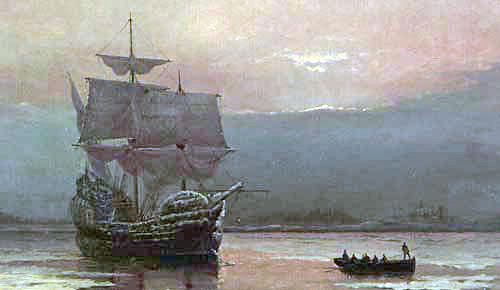Difference between revisions of "Mayflower DNA Project"
m (→Project dashboard) |
m (→Project summary) |
||
| Line 15: | Line 15: | ||
<!--* [[Project finances]]--> | <!--* [[Project finances]]--> | ||
| − | |||
| − | |||
| − | |||
| − | |||
| − | |||
| − | |||
===Methodology=== | ===Methodology=== | ||
Although the project ultimately plans to use all three types of genetic genealogy test results (Y-DNA, mtDNA, and autosomal/X DNA), at the present time, the focus is on using advanced Y-DNA and mtDNA tests to characterize the paternal lineages from the ''Mayflower''. <!--For each paternal lineage, we plan the ''Y Elite'' test from [http://www.fullgenomes.com Full Genomes Corporation] for at least one direct patrilineal descendant, followed by tests of individual genetic markers (identified from ''Y Elite'' testing) in additional participants through [http://www.yseq.net YSEQ].--> For each surviving lineage from the ''Mayflower'', this will provide the most comprehensive Y-DNA and mtDNA profile that is possible with current commercial genetic testing technology. When available, we will make use of prior genetic genealogy research related to these lineages (e.g. Y-STR test results) to provide supporting evidence and to guide project recruitment. | Although the project ultimately plans to use all three types of genetic genealogy test results (Y-DNA, mtDNA, and autosomal/X DNA), at the present time, the focus is on using advanced Y-DNA and mtDNA tests to characterize the paternal lineages from the ''Mayflower''. <!--For each paternal lineage, we plan the ''Y Elite'' test from [http://www.fullgenomes.com Full Genomes Corporation] for at least one direct patrilineal descendant, followed by tests of individual genetic markers (identified from ''Y Elite'' testing) in additional participants through [http://www.yseq.net YSEQ].--> For each surviving lineage from the ''Mayflower'', this will provide the most comprehensive Y-DNA and mtDNA profile that is possible with current commercial genetic testing technology. When available, we will make use of prior genetic genealogy research related to these lineages (e.g. Y-STR test results) to provide supporting evidence and to guide project recruitment. | ||
Revision as of 19:25, 26 September 2021
Project dashboard
- About the project
- Y-DNA and mtDNA Primer
- How you can help
- Results:
- Y-DNA (direct paternal lineages)
- mtDNA (direct maternal lineages)
- autosomal DNA (not yet started)
- Y-DNA of Allied Families
- mtDNA of Allied Families
Methodology
Although the project ultimately plans to use all three types of genetic genealogy test results (Y-DNA, mtDNA, and autosomal/X DNA), at the present time, the focus is on using advanced Y-DNA and mtDNA tests to characterize the paternal lineages from the Mayflower. For each surviving lineage from the Mayflower, this will provide the most comprehensive Y-DNA and mtDNA profile that is possible with current commercial genetic testing technology. When available, we will make use of prior genetic genealogy research related to these lineages (e.g. Y-STR test results) to provide supporting evidence and to guide project recruitment.
Through this approach, we aim to achieve the following objectives:
- Place the Mayflower passengers and crew into the broader human Y chromosome tree by determining high-resolution haplogroups for individual paternal lineages
- this can help provide a demographic-level picture of the ancestral origins of the groups comprising the 1620 Mayflower voyage
- these efforts will also likely aid in more general research of the human Y tree
- Identify unique, stable genetic markers for individual paternal lineages
- in some cases, it may be possible to identify one or two markers that confirm patrilineal descent from a single individual from the Mayflower
- Use the results to aid in genealogical research associated with the Mayflower passengers and crew, including tracing ancestry further back within England, Holland, etc.
- testing related lineages that stayed in Europe can be particularly helpful here
Contact us
Project administrators may currently be reached at mayflowerdna![]() gmail.com .
gmail.com .
References and External links
- Roser, Susan E., Mayflower Passenger References: from contemporary records and scholarly journals Stewart Publishing, Canada Second edition 2015
- Anderson, Robert Charles, The Mayflower Migration: Immigrants to Plymouth, 1620 New England Historic Genealogical Society, Boston, MA 2020
- Caleb Johnson's MayflowerHistory.com
- International Society of Genetic Genealogy
- General Society of Mayflower Descendants
- Guide to the Silver Books and Facebook Group
- "Mayflower" article on Wikipedia
- Family Tree DNA (FTDNA) & General Society of Mayflower Descendants Mayflower DNA Project
- Y-SEQ Mayflower Group
© 2015-2021 mayflowerdna.org All Rights Reserved
